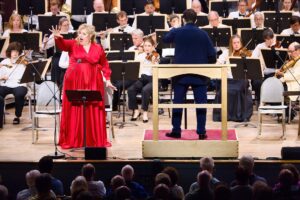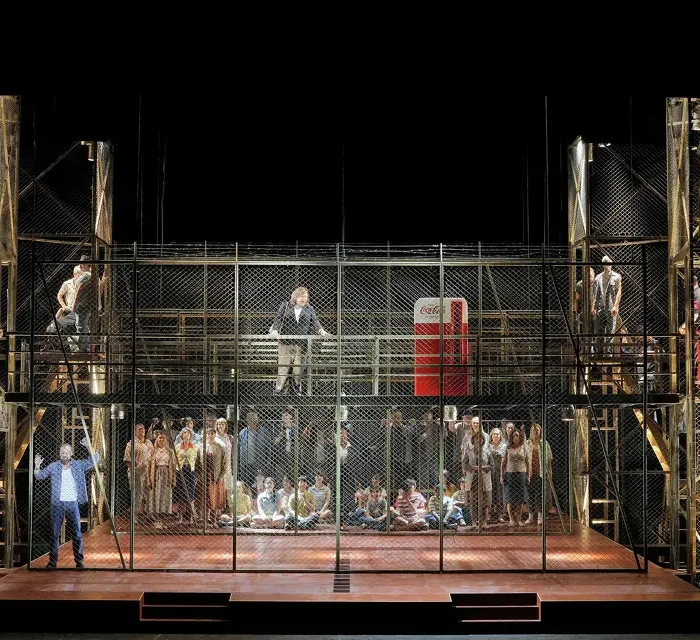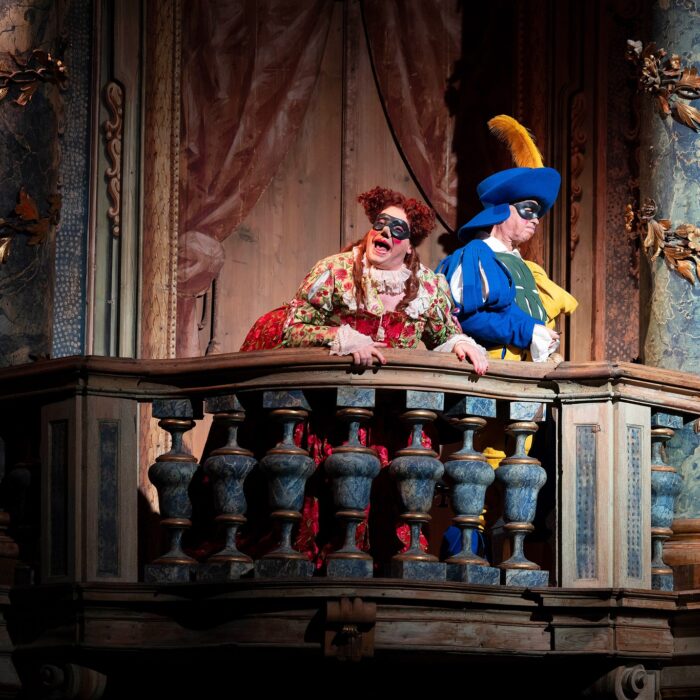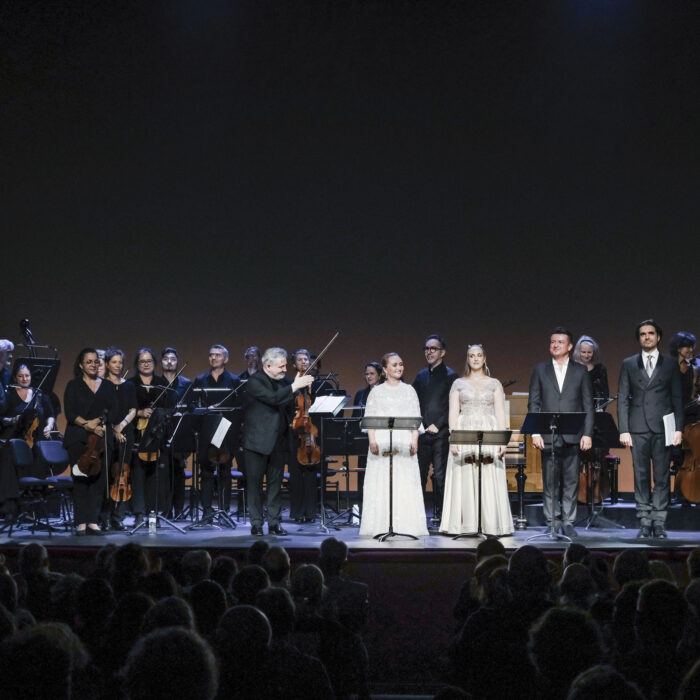
Tanglewood 2024 Review: ‘Götterdämmerung — Act Three’
A Moving and Theatrical Performance of the Finale to Wagner’s Epic Ring Cycle
By Matt CostelloThe summer home of the Boston Symphony Orchestra (BSO)—Tanglewood, in Lenox, Massachusetts—is well known for musicianship of the very highest caliber in a setting that, on many a summer night, is nothing less than wonderful. The recent and successful Leonard Bernstein film biography, “Maestro,” of course featured ‘Lenny’ there—a place that was perhaps his true musical ‘home’ more than anywhere else. Over the past few years, under Music Director Andris Nelsons, an interesting exportation of the operatic repertoire has been going on. That has included performing such a staple such as “La Boheme,” as well as Act Two of “Die Walküre,” and for this 2024 season, the grand finale of Wagner’s entire Ring Cycle: Act Three of “Götterdämmerung.”
The performance was both a revelation and revolutionary. Not, perhaps, in the way that Patrice Chéreau’s Ring Cycle was in the centennial year of 1976 in Bayreuth. I was there when it was received with palpable hostility for its—at the time—very modern and symbolic interpretation. The 1976 Rhine maidens, suddenly reduced to tarts strutting around a hydroelectric generator? At the time that was something quite difficult for members of the various attendant Wagner societies to absorb. All these years later though? That production has gone on to be greeted with standing ovations, having changed future Wagner interpretations worldwide.
But this semi-staged version, with titles indicating locales and action, was for me, in some ways, as equally novel and powerful a theatrical experience. The acting by all the principals was committed—certainly in line with the philosophy that theatre is a joint creative exercise between audience and performer, as described in Peter Brook’s classic work “The Empty Space.” The powerful orchestra behind the stage, with its army of violins, sextet of harps, and absolutely perfect brass, made this easily one of the most compelling, riveting, and dynamic performances of Wagner I have ever experienced. Of course, such a work demands great singers who are up to the challenges of the score. There were no concerns in that regard, with a cast full of singing actors much as the Wizard of Bayreuth himself would have dreamed about. That is certainly an advantage of having a single performance where a dream cast can commit. Besides their remarkable commitment to both acting and the nature of the staging, the cast brought vocal performances of remarkable power—even for Tanglewood—that were more than memorable.
The Rhinemaidens, sung by Diana Newman, Reneé Tatum, and Annie Rosen, were both charming and pliant, movingly so, and filled with the necessary foreboding. After all, it is their gold that has been taken in the prologue of “Das Rheingold,” and, with more tragic events to unfold, soon to be returned. As the villain of this final opera in the “Ring Cycle,” David Leigh’s Hagen was commanding, with a voice that easily stood in front of the massed forces of the orchestra and sang with depth and chilling strength. He was matched by James Rutherford’s Gunther, whose singing set up the interesting vocal and dramatic dynamic for the two murders to come—his own being one of them. They were supported by the Chorus of the Vassals, who sang and acted with a sly intensity, musicality, and ease that befitted their role as both commentators and observers of the dire events unfolding. Amanda Majeski’s Gutrune, caught in the triangle of deception of the characters onstage, brought a supple beauty to the role. Like the entire cast, she brought a palpable sense of tragedy to the singing and the events to befall her unwitting husband, Siegfried who, under the spell of a potion, has forgotten who he truly loves.
What a nuanced Siegfried this was. Michael Weinius’ engaging and often sweetly innocent performance not only recapitulated how he got to this point, with him having forgotten his Brünnhilde, but movingly recreated the powerful arc of this most epic of operas. His voice, with the orchestra behind him, sailed over that tumultuous Wagnerian sea. Certainly a Siegfried performance to cherish. But as we may know, having perhaps seen a few “Götterdämmerungs,” the arrival of Brünnhilde is too late to change the fate of her Siegfried. To both honor him and their love, she joins him as his funeral pyre’s flames grow ever higher, ultimately destroying Valhalla itself. The ending of this opera requires sheer power and beauty, and Christina Goerke commanded the stage as a Brünnhilde simply must. Goerke was easily at the very top of Wagnerian sopranos as she delivered the rapturous ending that will see justice done, as Hagen fatally tries to prevent the gold from at last returning to the Rhine and the maidens.
John Matsumoto Giampietro served as a staging coordinator, and that stage direction was fiercely imaginative throughout. One special aspect needs to be mentioned concerning all performers. “Götterdämmerung” is a massive piece, and the BSO’s famed brass, percussion, and strings filled the Tanglewood shed–and, I am sure, the woods of the Berkshires outside the open-air theater. Wagner, of course, designed his festival theater in Bayreuth so that the orchestra would be unseen and the sound somewhat subtle and subdued–not rolling out in what could be overpowering waves onto the audience. But here the cast had the full Wagnerian orchestral force right behind them. It is a testimony to that cast that there was never any doubt they could match the symphonic forces with performances as close to perfection as one could imagine. Nelsons once again showed a sensitivity to a Wagner score, as he did with Act One of “Die Walküre.” When full Wagnerian force was needed–as in “Siegfried’s Death and Funeral March”–it was electrifying. I can only hope for more such explorations from Nelsons. Even while standing with the audience for an ovation that simply never ended, I had to think about the other operas that would be revelatory when presented like this: a production that displays a theatrical way to experience operatic masterpieces. Perhaps “Parsifal,” or Act Three of “Die Meistersinger von Nürnberg?” Just think of the remarkable sound of both the BSO and those Wagnerian works.
Tanglewood is well known for creating magic in the mountains, and on the night of July 20, it did so again.


